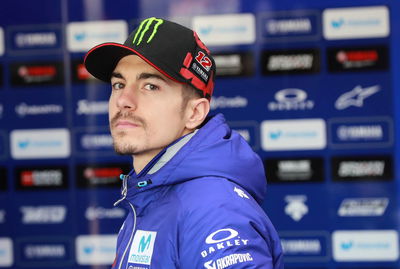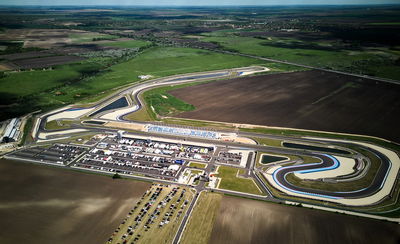‘I never believed I could be so strong at this level’
Not long after 15.30 on a rainy autumn afternoon outside Valencia, the curtain came down on one of modern grand prix racing’s more distinguished careers. Come the evening of November 18th, Dani Pedrosa was reflecting on the last of his 289 grand prix in a stellar 18-year career.
In some ways it was fitting that the finale of his considerable time among the grand prix elite should be held in the kind of deluge that may have left a younger, more inexperienced Pedrosa shivering in fear.
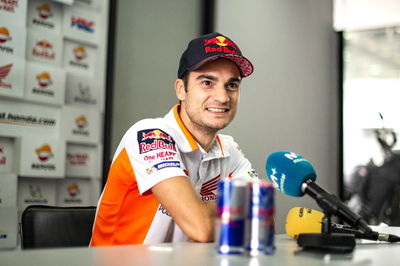
Not long after 15.30 on a rainy autumn afternoon outside Valencia, the curtain came down on one of modern grand prix racing’s more distinguished careers. Come the evening of November 18th, Dani Pedrosa was reflecting on the last of his 289 grand prix in a stellar 18-year career.
In some ways it was fitting that the finale of his considerable time among the grand prix elite should be held in the kind of deluge that may have left a younger, more inexperienced Pedrosa shivering in fear.
In the build up to his racing swansong, much was made of the Catalan’s failed attempts at claiming an elusive premier class title. So, too, was the ease with which he conquered the junior classes as a fresh-faced teenager, wracking up three world titles in as many years, a feat that earmarked him for greatness.
But, in conversation with Crash.net, the 32-year old Catalan, who sensationally decided to join KTM in a testing capacity in November, revealed his success in the rain – amounting to four wet weather wins in the MotoGP class – ranked alongside his greatest achievements.
Asked to give a particular personal satisfaction in a career that yielded 54 grand prix wins, Pedrosa responded without hesitation: “Riding in the rain,” he said. “For me the rain was something impossible since I was riding pocket bikes. I was very bad, very bad all the time - very bad.
“I had always big discussions with my father because he was so disappointed that I was maybe easily winning in the dry, and maybe Sunday was [motions rain falling from the sky] and then I was last.
“My father was always so disappointed and I always had such a terrible feeling when it was raining that I would disappoint somebody. It took me years and years [to overcome this].”
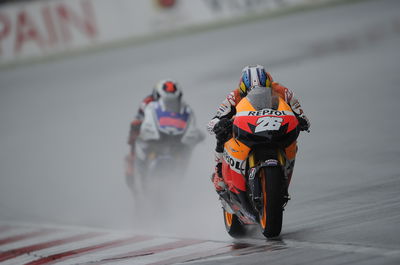
After close to seven years competing in the premier class, Pedrosa scored his first wet weather win in a monsoon deluge at Sepang, 2012
Pedrosa witnessed first-hand the importance of finding away to compete with the leading names in all conditions to sustain a championship challenge during unremarkable outings in the rain in 2006 and ’07.
The first signs of real improvement came at the German Grand Prix in 2008, when the then championship leader stormed to an early lead, and quickly built up an advantage of seven seconds in five laps.
While that particular outing may have ended in dismay – a crash entering turn one broke his left index finger and sprained his right ankle - the three-time world champion was now to be considered a force in the rain.
From there Pedrosa claimed a first wet weather podium at Le Mans the following year. Wins would follow, too, with his inaugural wet victory coming at Sepang in 2012. Further victories in similar conditions followed later that year at Valencia, Le Mans 2013, and Motegi 2015.
“My first podium in the wet was in 2009 and my first win was in 2012,” said Pedrosa. “Then I won three times. I’ve always been very, very, very proud within myself with the rain.”
“I never believed so strong that I could be at this level”
Aged just 16 years and 273 days, Pedrosa would claim his maiden grand prix triumph, after decisively breaking clear of Manuel Poggiali and Joan Olive in the closing stages of a typically hectic 2002 125cc Dutch TT. At that time, only Marco Melandri and Ivan Goi were younger when achieving their maiden successes.
As if three world titles in as many years (2003 125cc title, and the 2004 and ’05 250cc title) weren’t enough to convince the world he was the real deal, victory in just his fourth MotoGP race in 2006 made him the youngest ever rider to win grand prix in three different classes (future team-mate Marc Marquez would surpass this in 2013).
Pedrosa still remains the fourth youngest rider to win a 500cc/MotoGP race. Only Marquez, Freddie Spencer and Norick Abe were younger. Back in ’06 it appeared it would be the Spaniard – not 125 and 250cc contemporaries Casey Stoner and Jorge Lorenzo – that would provide Valentino Rossi with the stiffest opposition in years to come.
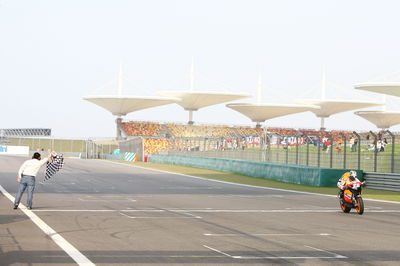
Pedrosa’s first MotoGP win at the 2006 Chinese Grand Prix confirmed his standing at the highest level but his doubts remained as to whether he could maintain a lengthy stay in MotoGP
Surprisingly, the rider from Sabadell on the outskirts of Barcelona claims he felt his smaller category success provided him with few guarantees about a lengthy stay at the highest level. It was not, Pedrosa says, until “I was five years in MotoGP” that he could envision a full, competitive career spent at the highest level.
“Honestly I never believed so strong that I could be at this level,” he said. “I knew I was riding fast and I was riding good, but I never expected to do what I have done.
“So you can imagine, I was thinking, ‘Maybe if I can arrive to the world championship.’ So [we’re talking] 125s, and not even thinking about 250s or MotoGP.
“I think the confirmation came more in MotoGP, when I was five years in MotoGP. It was like this. It’s strange. But that feeling of not being sure kept moving me forward.”
‘I was someone who faced many of the common problems every human has’
From his early days racing 125s, Pedrosa’s diminutive form made him stand out from the crowd. As his bow in the premier class came around, much was made of his five foot two frame, which saw him weigh in at a little more than 50 kilograms.
Manhandling a 157kg MotoGP machine became something of a mission for the lightweight Spaniard, and many of his contemporaries praised his ability to be competitive in spite of his weight disadvantage.
Not only did this contribute to a variety of nasty injuries; Pedrosa was arguably the rider penalised most by MotoGP’s switch to Michelin control tyres in 2016. The temperature-sensitive nature of the rubber meant he often struggled to heat his tyres in cool or wet conditions, leading to several uninspired outings.
Still, during this time Pedrosa scored three grand prix victories. He was fourth overall in 2017, and had it not been for a string of bad luck in the early part of last year, the Spaniard could conceivably have left the Spanish Grand Prix at Jerez as the championship leader.
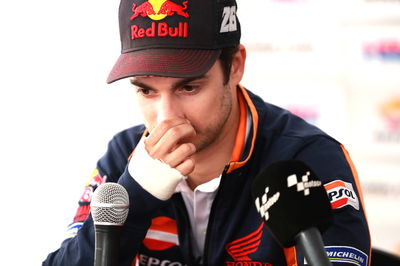
Injury was a near constant feature of Pedrosa’s time in the premier class. Here, in Austin 2018, he rode to a heroic seventh two weeks after breaking his right wrist
Asked how he would like to be remembered from his 18-year stay in the grand prix paddock, Pedrosa answered, “How I would like? Well, I don’t know, honestly. But of course [I’d like to be remembered as] someone who tried very strong and faced many of the common problems every human has, which is fear, which is negative thoughts, which is adversity, and not favoured situations.
“In MotoGP I tried always to overcome all the negatives that surround my condition, or the championship. The bikes changed, the rules changed, the bike weighed more, the tyres got harder, and there were many difficult points: injuries, and more injuries.
“This is something that everyone can face in his life during a certain situation. But also [I’d like to be remembered as] someone who had a good technique on the bike!”
